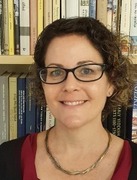Kontakt
Postanschrift:
Historisches Seminar der LMU
Jüdische Geschichte und Kultur
Geschwister-Scholl-Platz 1
80539 München
E-Mail:
Aya.Elyada@lmu.de
Lehrveranstaltungen im WiSe 2023/24
Vorlesung: Jewish Lives in Early Modern Germany
Seminar: Neighbors and Strangers: Christian-Jewish Relations in Germany, 1450-1750
Vortrag
25.10.2023 19 c.t. Uhr
Further Information
Prof. Dr. Aya Elyada is a tenured senior scholar at the Department of History, The Hebrew University of Jerusalem. Before joining the Hebrew University in 2012 Aya Elyada spent five years as a visiting PhD student at the University of Munich, and another three years as a visiting post-doctoral fellow at Duke University. Her book, "A Goy Who Speaks Yiddish: Christians and the Jewish Language in Early Modern Germany," appeared in 2012 with Stanford University Press. The book explores the unique and unlikely phenomenon of "Christian Yiddishism" in early modern Germany, namely the Christian interest in and engagement with Yiddish language and literature from the beginning of the sixteenth century to the late eighteenth century. It explains why some Christians were preoccupied with Yiddish and discusses the various ways in which they depicted this Jewish language and literature in their writings. In the process, it sheds light on the broader linguistic, theological, cultural, and social concerns of early modern Christian authors and their intellectual environment.
Aya Elyada's main fields of interest are German and German-Jewish history and culture; Christian-Jewish relations; Yiddish language and literature; the history of the Yiddish-German encounter; and the social and cultural history of language and translation. Her current project explores the place of Old Yiddish literature in modern German and German-Jewish culture.


